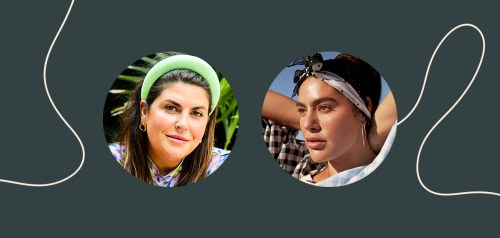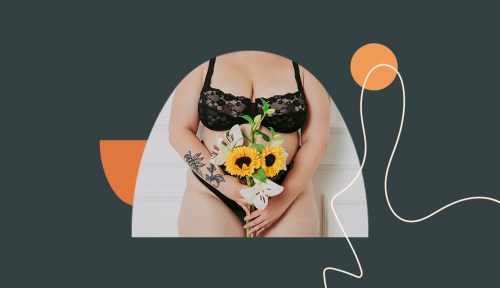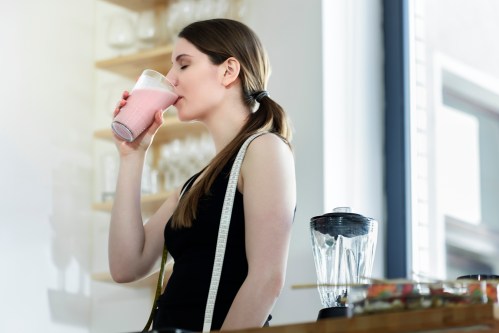Our editors independently select these products. Making a purchase through our links may earn Well+Good a commission
Over the past few years, conversations surrounding body diversity have taken center stage. Yet, with all the strides that have been made, there are still areas that could use improvement. For example, think about a time when someone shared their unsolicited opinion about how you look or exist in the world. Now, think about how you felt.
Whether it’s being told that you’re too thin, that you shouldn’t wear a particular item of clothing because it isn’t “flattering,” or that you need to lose weight, these messages indicate a society with a long way to go in terms of unlearning what makes a healthy body.
On the latest episode of The Well+Good Podcast, entrepreneur, founder of Megababe, and author of Body TalkKatie Sturino and model, writer, and content creator Jessica Vander Leahy get candid about experiences in relation to their bodies.
Listen to the episode on Apple and Spotify:
“I think it’s interesting because in my little corner of the Internet, it feels like we’ve made so much progress, but the second I step outside of it into what I would call ‘the rest of the world,’ we’ve made no progress,” says Sturino. For example, she recalls being told to lose weight by doctors as early as 8 years old, adding that little—yet extremely important—details such as the gowns not closing around her body have prevented care from feeling truly comfortable.
For Vander Leahy, she was taught to appreciate her body for all the things it could do, and that it is something to be grateful for, she says, but she still found herself having to cultivate a sense of appreciation for her presence in the world.
“It was very ultra-thin, ultra-white, ultra-pubescent sort of ideals of beauty being held up constantly,” she says of growing up in Australia, describing it as “a battle to try and find myself anywhere represented and to kind of grip onto anything that I saw in the media.” No one looked like her, but she says she would grasp onto different bits of representation, “and you would find those little bits of inspiration just to sort of see yourself in the world.”

In her work, she’s experienced having a fraction of the items of clothing to model compared to her thinner counterparts, even being on the smaller end of the plus-size spectrum. “I understand that brands can’t cater to absolutely everybody, but there has to be some level of representation there,” says Vander Leahy. That said, she has seen designers begin to embrace all bodies, in part because people on social media have demanded such change.
The perks of social media include connecting with people you may have otherwise not have had the opportunity to connect with and being able to find spaces that represent who you are, but there’s a darker side, too. “It has been really fundamental in just showing people that you don’t have to look how your friends physically around you look to find some way of being inspired to just embrace yourself a little bit more, which I think is really exciting. But there is a definite toxic downside to the socials,” says Vander Leahy.
For example, solely following someone because you deem them to be body “inspiration” or “thinspiration” says Sturino. “I find that that is such a toxic way of looking at your body. Putting a body in front of you that really doesn’t have anything to do with your shape, your anything. You have no idea what the person on the other end of the photo is doing to get that body, so I feel like that can be really bad.”
“My approach is to just be a bit unapologetic in how I exist in the world.” —Jessica Vander Leahy
To continue to move the conversation forward and create more inclusivity, Sturino recommends being more aware of how we talk to ourselves. We’ve also got to be better advocates by having conversations with brands on social media and holding them accountable. Taking it a step further, Sturino also recommends “becoming more aware of the way that other people with different bodies might exist in the world…because you can actually just get perspective and then that helps bleed into better behavior.”
When it comes to how you feel about yourself, Vander Leahy says a good starting point is to have fun with the way that you look by experimenting, playing, and dressing up. “My approach is to just be a bit unapologetic in how I exist in the world,” she says. “And my existence is resisting all of that pressure to maybe be a different way, and you know that just comes with age.”
Listen above, and subscribe to The Well+Good Podcast on Apple, Spotify, or wherever you get your podcasts.
Sign Up for Our Daily Newsletter
Get all the latest in wellness, trends, food, fitness, beauty, and more delivered right to your inbox.
Got it, you've been added to our email list.










